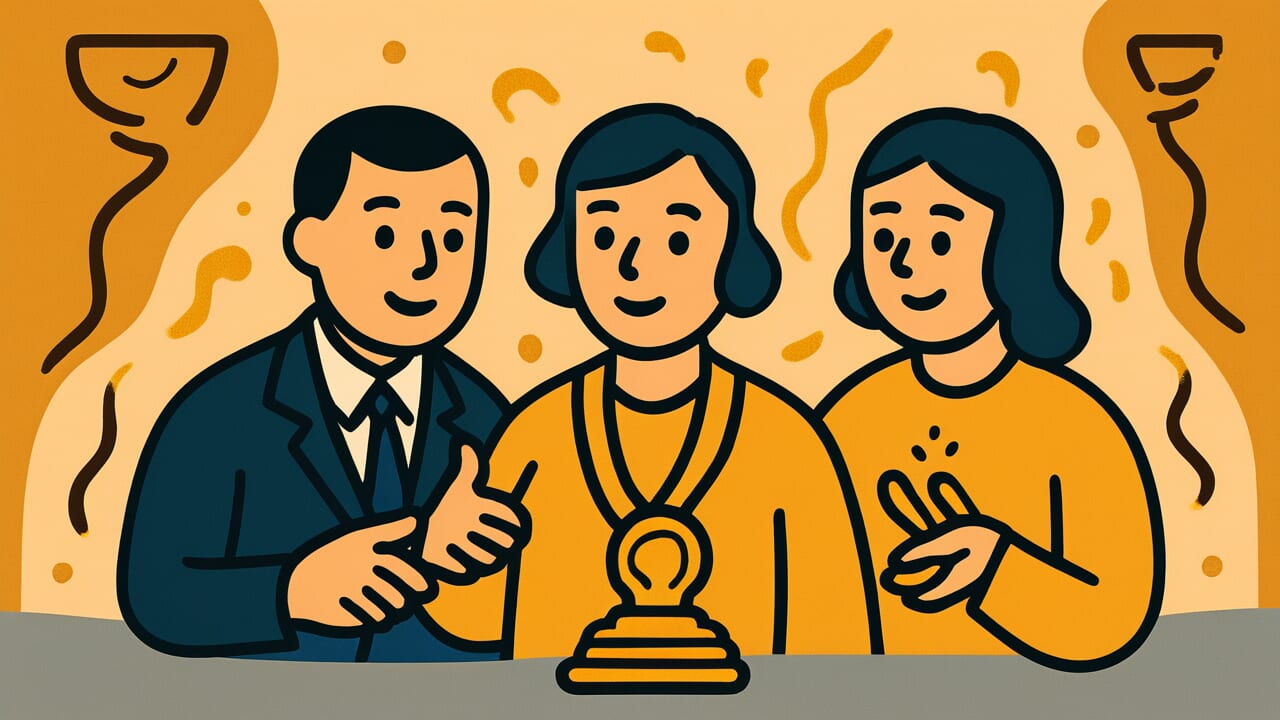How to Read “When three people gather, they can even melt gold”
Sannin yoreba kane wo mo tokasu
Meaning of “When three people gather, they can even melt gold”
This proverb means that when several people gather and talk, even baseless rumors can spread through society as if they were solid facts. Eventually, no one can deny them anymore.
You use this proverb when groundless rumors are spreading or when you see facts being twisted within a group.
For example, you might say, “As they say, when three people gather, they can even melt gold, so we need to be careful about rumors.” It points out the dangers of group psychology.
This expression warns about the negative side of people gathering together, especially the destructive power of gossip.
Things people wouldn’t say alone become bold statements in groups. Unconfirmed stories start walking around as facts. This proverb cautions against this phenomenon.
Even today, we see exactly what this proverb describes. Information spreads on social media in the same way.
Origin and Etymology
No clear written records explain the origin of this proverb. However, we can make interesting observations from how the phrase is constructed.
There’s a famous proverb: “When three people gather, they have the wisdom of Monju.” This means even ordinary people can produce brilliant wisdom like the Buddhist deity Monju when three gather together. It has a positive meaning.
In contrast, “When three people gather, they can even melt gold” uses the same structure but delivers the opposite warning.
The expression “can even melt gold” is very striking. Gold is especially hard and resistant to change among metals.
The metaphor of melting even gold powerfully expresses how frightening rumors and group psychology can be.
It shows how solid facts and truth can change shape as they pass from mouth to mouth. Eventually they disappear completely. The image compares this to gold melting from heat.
Consider the Edo period townspeople’s culture. Neighborhood well-side meetings and teahouse gossip were common.
People had many chances to experience the power of rumors firsthand. This proverb likely emerged from such experiences. It sounds an alarm about group psychology.
Usage Examples
- That rumor has no basis at all, but as they say, when three people gather, they can even melt gold—now everyone believes it’s true
- When I look at online comments, I really understand the saying “when three people gather, they can even melt gold”
Universal Wisdom
The proverb “When three people gather, they can even melt gold” offers deep insight into the frightening power of human group psychology.
Why do people say things in groups they would never say alone? Why do they speak of baseless stories as if they were facts?
It’s because responsibility becomes dispersed within a group. Individual conscience and judgment become numb. The comfort of “everyone’s saying it” makes people lazy about verifying the truth.
Even more interesting is how rumors change as they spread. Small details get added along the way.
What started as a minor question transforms into “reliable information” as it passes from person to person. Like a game of telephone, the original truth disappears. A new “fact” created by the group emerges.
This proverb has been passed down through generations because rumors often overpower truth in human society. This phenomenon repeats across time periods.
Our ancestors saw through the fragility of truth within groups. They understood the destructive power of rumors.
The expression about melting even gold carries a warning. It shows how even the hardest facts can be erased by people’s mouths. It alerts us to the frightening nature of human society.
When AI Hears This
When you view three people gathering to melt gold through complexity science, a surprising structure appears.
One person starts the fire, one sends wind, one adds charcoal. This division of labor itself is simple addition. But notice the temperature increase pattern.
The fire’s temperature doesn’t simply triple. Rather, when three actions work simultaneously, heat accumulates faster than it escapes. The system breaks through a critical point. This is phase transition—the moment solid gold becomes liquid.
In physics, substances suddenly change state when they cross certain thresholds. Water becomes ice at 0 degrees, steam at 100 degrees.
What’s interesting about this proverb is it suggests the same threshold exists in human cooperation. Two people don’t generate enough heat—the gold stays solid.
But the moment a third person joins, the entire system crosses the critical point. A completely new state emerges.
Modern organizational theory confirms this. Research shows creativity jumps sharply in three-person teams.
With one or two people, thinking patterns stay fixed. But with three, combinations of opinions explode. Unexpected ideas emerge.
It’s not the sum of individual abilities. The interaction network itself creates something new. This proverb understood through experience that cooperation’s essence isn’t addition—it’s state change.
Lessons for Today
This proverb teaches you how to approach information in modern times.
First, never believe information just because “everyone’s saying it.” Topics spreading on social media, rumors at work, things your friend group talks about as obvious truths.
When you encounter these, pause and ask yourself, “Is this really true?” Make this a habit.
At the same time, be careful not to become someone who spreads rumors yourself.
If you casually repeat unconfirmed stories, they might become the “flame that melts gold” and hurt someone’s life. Words have weight. Once spoken, they cannot be taken back.
In modern society, information spreads around the world instantly. That’s why an attitude that values truth matters more than ever.
When you become someone who verifies information, you help protect society’s overall health.
Don’t get swept up in the group’s flow. Have the courage to see truth with your own eyes.


Comments